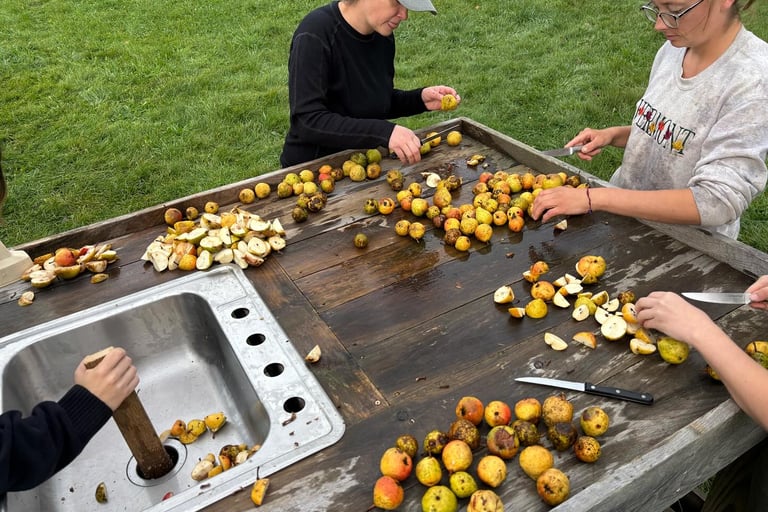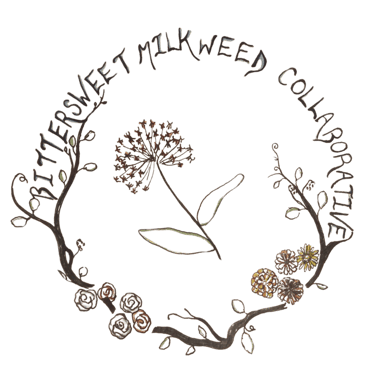October 2024
What does it mean to have security?
Kia-Beth Bennett
10/22/20245 min read
I’ve rewritten this newsletter a half dozen times in my head, and still keep circling around a multitude of thoughts, stories, issues and ideas. The truth is, September sucked. Climate change turned a normally mild, rainy month into a hot drought, and the fractured ecological rhythms brought late blight to all the tomatoes and most of the potatoes - many of whom should have already been dead from a frost that didn’t come. At eight o’clock one night, I texted the Collaborative with a shaky, tear-stained hand, asking for help.
Plants aside, the weather on its own was emotionally stifling to me - my body requires the physical changes of a frost, a cloudy day, a shift in scents, to understand that the seasons are moving and so my actions must mimic that. A hot, sunny Autumn meant my brain and body were not in sync, and I spent a lot of time wandering, unsure. It didn’t help that Brian and I were the only crew members around all month - with no one to direct, I became directionless. It was unquestionably difficult.
This is not a pity party letter, or a lament of the horrors of this life. I wouldn’t call anything that’s happened inherently ‘bad’. This is an acknowledgement that it can all be tough. Moving forward, standing still, celebrating, crying, joy, anger - it is hard. The pain, sometimes, is how I know I’m still going, because that pain is usually the accompaniment to my learning. I can feel my heart, brain and soul stretching as I reconnect with forgotten wisdom, gather snippets of knowledge I can implement, and discuss the complexities of building and living in a socio-ecologically healthy culture.
And so now we’re in October. The first, second and third frosts have finally arrived, one month late. The root cellar is filled with winter squash, the kitchen with peppers, tomatoes, potatoes, beans, corn, dried herbs and unripe, baby pumpkins for immediate cooking. There are thirty gallons of vinegar fermenting, most the result of an odd cider-pressing party we threw together at the last minute. We’re harvesting more potatoes and corn, and processing the last of the zucchini. In this busy-ness is purpose, and a sense of security. I love sitting in the root cellar (the master bedroom), looking at scads of full canning jars and bushels of shallots, garlic, and onions and thinking, “We’re going to be okay. We’re going to be okay.”
I recognize that we can certainly trace some of this year’s harvest to money - after all, I paid Carly to dig and clean the garlic I ate last night. Hopefully, she’s also eating it, as everyone who steps foot on the farm goes home with goodies. But the security I feel in the root cellar could never be re-created with a bank account of cash. Money was created hand-in-hand with the concept of scarcity and greed, and those ideas are unbound to the concepts of trust, security and responsibility. I’m incredibly grateful for the applesauce, salsa and jam in the pantry, and I’m looking forward to the fried chicken I’ll eat this Winter. But if I didn’t farm, even with one million dollars, I couldn’t purchase that specific food - both because the deliberate fluctuations of the capitalistic market may well keep them out of reach, but also because if I weren’t here, working with this land, to produce that specific food with that specific terroir, I don’t think anyone would be. If I and my neighbors didn’t exist, what grocery store would possibly stock its shelves with pasture-raised Tamworth pork?
So what do we do when money doesn’t buy life?
Last weekend, I attended the annual littleGrasse Foodworks Swap. Fifty or so locals crammed into a barn and shared with each other the work we’d done over the year - I traded celery for chevre, popcorn seeds for a painting, lard for a decorated light-switch plate, and talked to all those with whom I hadn’t spoken since the last Swap. Flip, one of the hosts, reflected on the fact that she can look around her farmhouse and see items from every participant - that littleGrasse Foodworks was not just built by her and her partner, Bob - it is the multi-piece result of everyone they love.
The Swap has always been Ann’s and my favorite event, and this year, it was truly tied to my thoughts on security. Security is not always about having thousands of dollars in the bank and extra jars of olives in case climate change wipes out this year’s crop. It’s not about buying the last toilet paper “before someone else gets it!” It’s about relationships. It’s about networks, built by the hands around you. It’s knowing that if I can’t milk our cow next Spring, Anna will still be milking hers. If the goats at Nursery Hill need tending, I will drive over. If the chimney construction takes a sudden left turn, I call Jeremy. If I have extra Bacillus subtilis (a bacteria that prevents the spread of late blight), I share it with the neighbors. Not one of these interactions directly require funds - it’s simply neighbors being neighbors, humans doing what, believe it or not, humans do best: acting as social animals.
At the BMC, we’re expanding our connections through deliberately turning to each other, and away from the market. Last week, when a lost thermometer threatened the flow of chicken butchering, I went to the Bartholomew’s to borrow one - a simple sounding event that was purposefully planned. I will admit that though I’m proud of that step, the Bartholomews live several miles away, and that I was too shy to first just ask Emma next door. But still, it’s happening. A borrowed thermometer here, an assist in cattle herding there - this is caring in action, and it is happening now.
My friends Adam and Sam once wrote a series of public letters to each other, discussing and debating generosity, sharing, and the metaphor of capitalistic infrastructure as a sinking ship, the ocean being the Rest of the World, the Real World, where relationships and care can exist.
The question, “Can you learn how to swim by pretending you are in the water?” came up. Can you live in capitalism, and still prepare yourself for a life outside of it?
Well, yes. I believe you can. I argue that that is exactly what is being done here and in pockets around the world. I still pay my mortgage, I still purchase gas. But three years ago I wouldn’t have had the courage to borrow a thermometer. One year ago I wouldn’t have been in the right mental state. Today I text Acorn Acres and Aloysius Homestead so we can schedule a group butchering day, coming together to share in the labor and love of slaughtering two bulls and dividing up the meat.
I leave you with a final thought - I didn’t know how to do all this neighboring. I still don’t, some days. I suspect that if you were raised in the same America as I, you don’t either. But I do know this: if we are to learn to swim, if we want our lives made up of those we love, then we must turn to both the light and dark. We must exist with that chiaroscuro, one hand holding the healing and one holding the suffering. And then we must dive. We take a deep breath, we step out that door, and we offer the neighbor some help cleaning gutters. We borrow the sugar. We ask if anyone wants to carpool. We, for the love of each other, just try, dammit. We just try. Eventually, something’s going to stick.
With love in action,
Kia-Beth


